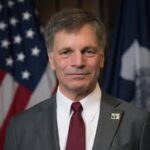 CHEYENNE, Wyo. – Governor Mark Gordon, Wyoming Senate President Dan Dockstader and Speaker of the House Eric Barlow jointly recognize that Wyoming has a rare opportunity to invest in the future of the state with funds from the federal American Rescue Plan Act (ARPA). The State has received $534 million in ARPA funds to date, with another $534 million anticipated during 2022. Unlike the short time frame to expend funds received through the Coronavirus Aid, Relief and Economic Security (CARES) Act, the State of Wyoming has until December 31, 2024 to obligate the ARPA funds and until December 31, 2026 to spend these funds.
CHEYENNE, Wyo. – Governor Mark Gordon, Wyoming Senate President Dan Dockstader and Speaker of the House Eric Barlow jointly recognize that Wyoming has a rare opportunity to invest in the future of the state with funds from the federal American Rescue Plan Act (ARPA). The State has received $534 million in ARPA funds to date, with another $534 million anticipated during 2022. Unlike the short time frame to expend funds received through the Coronavirus Aid, Relief and Economic Security (CARES) Act, the State of Wyoming has until December 31, 2024 to obligate the ARPA funds and until December 31, 2026 to spend these funds.
Governor Gordon expressed his commitment to a thoughtful, purposeful, transparent, and strategic approach to handling ARPA funds…
“These are dollars borrowed by Congress from many generations yet to come, and if we are going to use them, in my mind, those future generations that will be paying for them must also benefit from them,” Governor Gordon said. “ARPA funds, if we are to use them, must be for the greater benefit of Wyoming citizens, not for a few shiny distractions.”
The Governor has assembled a “strike team” to better identify the things the state needs to do to survive, and what can be done to better drive to a future where all of Wyoming can thrive. The Governor anticipates directing a fraction of the federal funds already provided to the state to address emergency funding needs this year.
For the remainder of the federal funds, Governor Gordon has identified the following enduring funding criteria:
- Have a long-term impact or a return on investment
- Not replenish budget cuts unless the replenishment can be sustained
- Be sustainable and not add to the State’s ongoing financial responsibilities
- Support stimulus over relief
- Where possible, leverage the dollars through matching or buy-in programs
- Create capacity for the future
- Benefit a wide group of citizens
To ensure that these criteria are met, Governor Gordon and the Legislature’s Presiding Officers recognize that a deliberative process which provides for collaboration and input from all interested parties is essential.
“The federal law provides ample time to be methodical in determining our priorities,” Speaker of the House Eric Barlow said. “We can use this time to take public testimony, have robust discussions among the legislative membership to develop legislative priorities fully and thoughtfully, and to collaborate with the executive and judicial branches to determine the best and highest uses of ARPA funds.”
To achieve that end, the three leaders do not see the need for a special legislative session this summer but are committed to following the normal processes for development of the state budget and legislative committee bills to develop priorities for the allocation of ARPA funds.
“A product developed with months of deliberation will be significantly better than any legislation compiled in a few days of hearings and a week-long special session,” Senate President Dan Dockstader said. “We can utilize our standard budget hearing and standing committee processes to allocate these funds in a conservative manner during the 2022 Budget Session.”
While all three leaders acknowledge that school district and local government funding will not be reduced this year, reductions in state funding for the FY 2023-2024 biennium for schools and cities, towns and counties are possible in next year’s Budget Session due to the infusion of ARPA funds. However, the three leaders recognize that any reductions must be deliberately considered, and that opportunities exist to find ways to partner and extend the benefit of the funds.
Governor Gordon will present the initial recommendations for emergency uses of ARPA funds developed by his strike team to the Legislature’s Joint Appropriations Committee on June 15 in Cheyenne.




